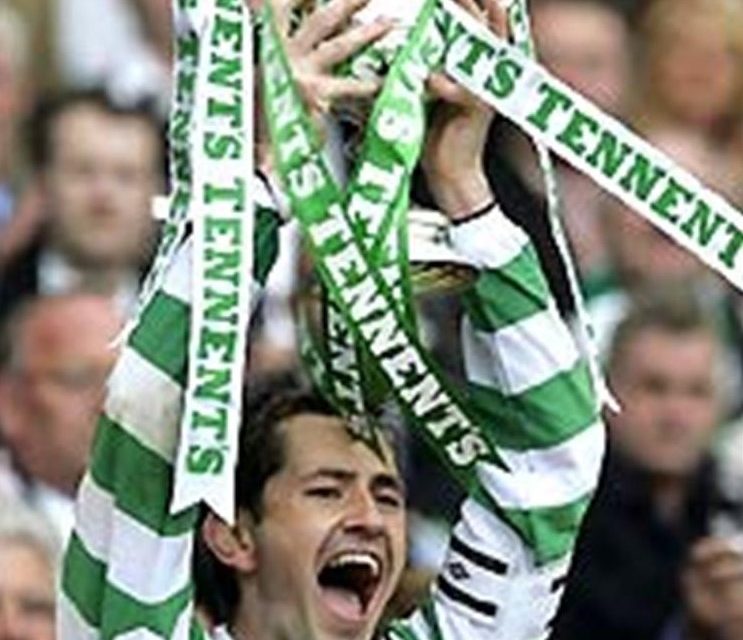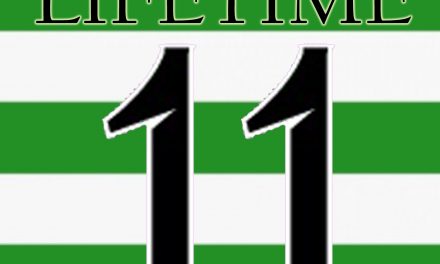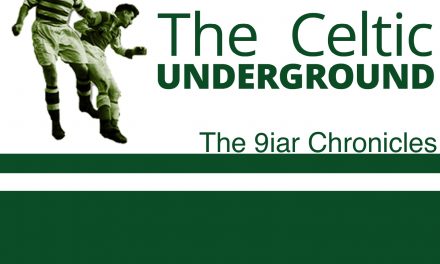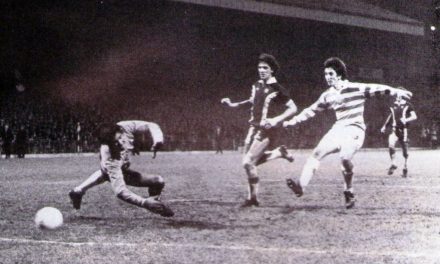I well remember how Tommy Burns tried to mould his new Celtic team after taking over as Celtic manager in 1994 and by the autumn of 1995 the personnel of the squad had changed dramatically. Out went such luminaries as Mark McNally, Willie Falconer, Paul Byrne, Charlie Nicholas and Tony Mowbray, to be replaced by the new charges at the club; Phil O’Donnell, Tosh McKinlay, Pierre Van Hooydonk, John Hughes and Andreas Thom. A huge improvement in quality.
In early October of 1995 the newspapers greeted Celtic fans with the new as that Celtic had signed Dunfermline’s Scottish under 21internationalist right-back, Jackie McNamara, for a fee of £600,000. Dunfermline were in the second tier of the Scottish game at that time so not a great deal was known about the young Jackie other than he possessed a famous name. His father, Jackie McNamara senior, had been a notable player for Celtic and Hibs (in particular) in the 1970’s and 1980’s and had been dreadfully unlucky with injuries at Parkhead which had partly resulted in his move to Easter Road.
Young Jackie’s debut came at Brockville in a midweek league fixture in October 1995. After signing for Celtic a day earlier, he had the misfortune of having his boots stolen after his car was broken into whilst parked in the Celtic Park car park. Legend has it that Tommy Burns got in touch with a few contacts from the Calton area and the boots were recovered a few hours later. Celtic’s full back partnership that night was McNamara and Jamie McQuilken and both of them looked painfully young at the tender age of 20 years old apiece. Both boys came through a stiff test on the night with Celtic edging a hard fought game by 1-0, courtesy of a brave John Hughes header.
Within weeks Jackie was being hailed as Celtic’s best signing for years following a string of fine performances. The team went on a long unbeaten run and one goal at Easter Road is fondly recalled when Jackie lobbed Jim Leighton to score after a scintillating move with Simon Donnelly. Indeed the combination play between the two saw comparisons made to the link play of the legendary dup of Danny McGrain and Kenny Dalglish from a generation before. There is no higher praise than that.
Jackie may have looked slightly built but he was a ferocious tackler and Celtic fans took to his committed style of play from the start. In March 1997, a bad tempered Glasgow derby game saw Jackie sent off for swinging a punch at Rangers’ striker Mark Hateley. Looking back there was something rather amusing at the slight figure of Jackie having a dig at the imposing figure of Hateley.
Celtic’s defeat that day ultimately led to Rangers winning their own version of 9-in-a-row and Tommy Burns’ tenure at Celtic was now over. He was replaced by Wim Jansen and the Dutchman changed Jackie’s position in the team by moving him forward into an attacking midfield role from his right-back beat. The move was a huge success with Celtic winning the league and league cup in Jansen’s only season with Jackie’s excellent form resulting in him winning the Scottish Player of the Year award and gaining a place in Scotland’s World Cup squad in France ’98.
Jo Venglos replaced Jansen and Jackie retained his place in the team. Venglos himself only lasted one season with John Barnes taking over as ‘Head Coach’ in a blaze of publicity. Jackie remained a consistent performer during a period of inconsistent results and Barnes was sacked in February after that embarrassing defeat to Inverness, a game in which Jackie missed through injury.
Martin O’Neill became Jackie’s sixth manager within a remarkable five year spell and O’Neill made maximum use of Jackie’s versatility. He turned out at right back, left back, centre back, holding midfield and attacking midfield. And could be relied upon to perform well in every role he was given. In the 2001 Scottish Cup final he came on as an early substitute against Hibs and scored the vital opening goal to set the team on their way to a 3-0 win which resulted in the first domestic treble since 1969. These were now great times for Celtic supporters who had basically been starved of success for over ten long years.
Jackie was also instrumental in Celtic’s march to the 2003 UEFA cup final in Seville and he appeared as a substitute for Paul Lambert against Porto. The next season saw O’Neill’s team go from strength to strength with a league and cup double. Jackie was named as captain in the 2004 Scottish Cup final against Dunfermline in the game where Henrik Larsson scored twice in an emotional last appearance in a Celtic jersey.
The next season saw Jackie lift the Scottish Cup again in his testimonial season. 50,000 fans turned out for his testimonial game on an emotional afternoon to pay tribute to his fine service over the previous ten years. Jackie was now out of contract and despite new manager Gordon Strachan wanting to retain his services, he rejected a one year contract from Celtic for a two year deal in the Midlands with Wolverhampton Wanderers.
Jackie will always be fondly remembered by the Celtic fans. He came into the side during the chaos of the 1990’s and he grew in stature as the stadium developed in tandem.
It was a great shock to all of us when it was recently reported that Jackie was seriously ill in England after a bleed on the brain. The good news is that he regained consciousness and was said to be sitting up in hospital and talking. This appears to be an improvement and the hope is that he will now go on to make a steady and full recovery.
The best wishes from every Celtic fan will go to Jackie and his family at this time. We hope that he will soon be back at Celtic Park as a guest of the club as Jackie McNamara will always be due a warm welcome at Parkhead.





